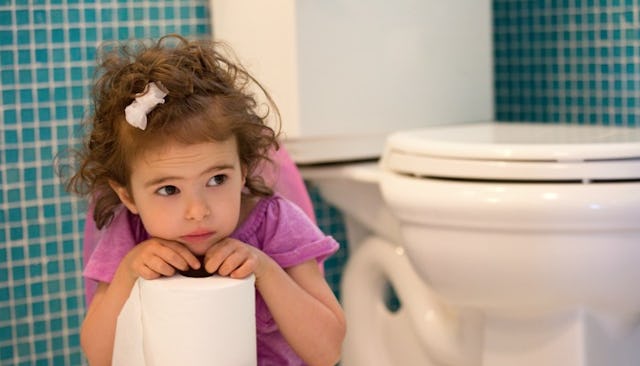Potty Training Regression Sucks, But We Will Get Through It

When it’s time to potty train, you think you’re prepared. Maybe you’ve read some books, or you have enough friends who’ve done it with their own kids that it doesn’t seem like as big a deal as people make it out to be. And then it happens, and it’s hard for a while — maybe a few weeks, maybe even a few months. There are accidents, there’s some acting out, there’s a shitload (literally) of laundry, and then it’s basically done. Your baby is a little boy or girl now! And while the road to your child’s autonomy is not entirely obstruction-free, it’s pretty clear.
There’s another side to potty training that we don’t talk about enough though — regressions. Not the little regressions that happen to your 2-year-old after having them trained at 22 months. No, I’m talking about the regressions that happen once your child has entered the school system. The regressions that happen when you figured your kid was too old for this stuff.
I’m living that dream (okay, nightmare) right now with my daughter, and it has me discovering parts of myself I didn’t know existed. Dark, dark parts of myself that only come out when, for the fifth time this week, she gets up from the couch with a wet back end, and I ask if she knows what’s happened and she tells me she’s had an accident. And when I ask her how long she’s known, she shrugs.
My husband and I have always made it clear to our daughter that if she has an accident, it’s fine. We won’t get angry. Accidents happen, and sometimes we don’t feel the urge until it’s too late, or we’re just not paying attention. I have always been very clear that I don’t want my daughter to feel any shame about the accidents she has, because I grew up with a fairly rare, and for a long time undiagnosed, bladder disorder. It wasn’t until I was 10 that I finally ended up with a pediatric urologist who was able to explain what was happening and prescribe me medication to prevent accidents from happening.
The shame I experienced because of this disorder was overwhelming. It haunts me to this day, and up until recently, it was guiding me in how I negotiated the challenging terrain of potty training. I desperately wanted to make sure my daughter didn’t feel ashamed if and when she had accidents. Thankfully, we were successful on that front — she never seems embarrassed or worried of what people will think when she has an accident, no matter where she is. One point for me, right?
If the story ended here, I’d definitely take the point, but toward the end of her first year of school — what’s known as “junior kindergarten” in Toronto, and pre-K in the United States — we moved out of the city. Her routine was completely disrupted and the friends she had been making all year all but disappeared from her life. We lived out of boxes for weeks on end, straddled between two homes as we tried to let her finish off the school year even though we’d already moved 45 minutes out of town.
Suddenly, her occasional accidents increased dramatically. There were still days when she didn’t have any accidents, but there were also days when she had upwards of five. She would come home from school wearing someone else’s pants and no underwear, because she had gone through her three changes of clothes. And then she’d come home and have another few accidents before bedtime.
We tried to be positive, or at least neutral, when she had them — always explaining that we weren’t mad at her, just confused about why she couldn’t tell when she had to go. I reminded her more frequently to go pee (she never had problems with listening to her body when she had to poop, strangely), and more frequently, she came back from the bathroom saying she was unable to go, only to have an accident a short while later.
Then she admitted that sometimes she held her pee in when I asked her to go because she didn’t like being told what to do. Then she admitted that she hated washing her hands, and that’s why she didn’t want to go pee. Then she said she couldn’t feel when she had to go, which I believed for a good amount of time, until I remembered that she had never had an accident when we’d been out at a restaurant; instead she always asked to go to the bathroom. Interesting.
My daughter has just turned 5, and I’m aware that she’s likely suffering from massive FOMO and just ignoring her body’s urges until it’s too late. It’s not uncommon, right? I’ve talked to our doctor, and she believes it’s behavioral. The power struggles we go through each day, though, are harrowing. She chooses not to drink water at school because she doesn’t want to have to pee. I will ask her to go to the bathroom before school in the morning, and she will make such a big fuss that we risk being late. I yell, I plead, I threaten (and then follow through by taking things away), I bargain, I make reward charts. Nothing has worked for more than a week or two.
Each day is an ordeal for us right now. She is clearly agitated to be doing something that is a natural part of life, and I’m not sure how to help her through it. No amount of reasoning has helped, and no amount of talking through it with her has changed things.
For now, I have to hope that when people tell me not to worry, that she won’t be having five accidents a day when she’s 16, that they’re right. For her sake.
This article was originally published on